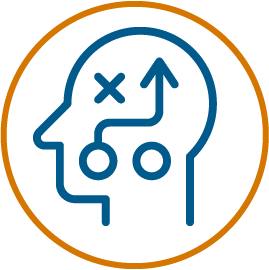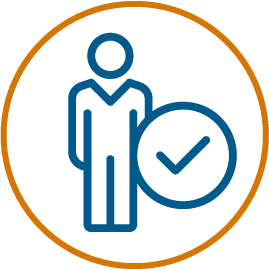Learn how to counsel children and young adults, and prepare to become a licensed school counselor in Massachusetts.
Program Type
Master's
Semester Start
Summer
Study Options
Online, Hybrid
Minimum Duration
2 Years
UMass Boston’s Counseling master’s program was ranked as one of the Best Online Graduate Education Programs by U.S. News & World Report. This program focuses on a series of general counseling courses, as well as school counseling courses to prepare you for a career as a school counselor. It’s designed for people interested in pursuing an advanced degree and state licensure to work in school systems whereas the Mental Health Counseling master’s program is designed for people interested in working in mental health agencies and hospitals. The program begins with a two-week in-person study at or near the UMass Boston campus where you’ll get to know your cohort and complete the first two clinical courses (6 credits) of your degree. Throughout the program, you’ll get hands-on experience through supervised fieldwork in local schools where you reside. At the end of the program, you will be eligible to apply for licensure to work as a school counselor in Massachusetts provided you complete internship in Massachusetts.**
Students also have the option of adding an adjustment counseling concentration to their plan of study, which requires two additional courses, as well as additional internship hours. The adjustment counseling concentration allows students to be eligible for the Department of Elementary and Secondary Education K-12 initial level licensure as a school adjustment counselor.
The UMass Boston Counseling MEd program is ranked:
Ranked as one of the Online Graduate Education Programs by U.S. News & World Report.
Ranked as one of the Best Online Graduate Education Programs for Veterans by U.S. News & World Report.
Ranked as one of the Graduate Education Programs by U.S. News & World Report.
The Counseling MEd is accredited by the Masters in Psychology and Counseling Accreditation Council (MPCAC) for the period of September 2013 through September 2023.
Tuition
- This program consists of sixteen 3-credit courses and two 6-credit courses, or 60 credits.
- The Adjustment Counseling concentration consists of two additional 3-credit courses, or 6 additional credits.
- Online tuition is $575 per credit.
- Total estimated tuition cost to complete this program is $34,500.
- Total estimated tuition cost to complete this program with the Adjustment Counseling concentration is $37,950.
- Estimate is based on completing program by minimum duration. Other fees may apply. Request Info to connect with a program representative for further details.
- This program also has an on-campus option. Visit https://www.umb.edu/bursar/tuition-fees/ for on-campus cost information.
Deadlines
- Priority deadline is January 2
- Final deadline is February 15
Applications are reviewed on a rolling basis prior to the February 15 deadline. We recommend submitting your application as early as possible for the best chance of admittance. Most spots are already filled by the application deadline of February 15.
Application Checklist
- A completed application and fee.
- Two letters of recommendation where at least one letter should be from a person who knows your academic work. We strongly recommend getting letters from professors whenever possible but we will accept a letter of recommendation from a supervisor if you have been out of a school for some time.
- A statement of purpose detailing your goals, professional experience, and reasons for applying to the program. Your essay should consist of your reasons for wishing to pursue graduate study in 300 words (part 1). Then, indicate your specific interests and discuss the kind of work you would like to do in your intended field in no more than 1200 words (part 2).
- Official undergraduate and graduate transcripts from all the universities you attended. All transcripts must be official and sealed.
- All school counseling applicants who want licensure in the state of Massachusetts must complete the MTEL test (Communication & Literacy Skills—-reading and writing) by the application deadline or any time before the end of their first year at UMass Boston. If you reside in another state, please confirm with your respective state’s licensing board.
- Please include an updated résumé. The school counseling professors will conduct on campus and online interviews with prospective students.
- Optional: writing sample.
- Please note that the MEd program in school counseling start term is summer.
All application materials must be sent to UMass Boston’s Office of Graduate Admissions at:
UMass Boston Graduate Admissions
100 Morrissey Boulevard
Boston, MA 02125
Two-Week Intensive at UMass Boston
All online students attend a study for two weeks at the UMass Boston (UMB) campus where they complete two clinical courses. These clinical courses are taught during the first summer of the program over a two week period, and students must be present at UMB to complete this work. Typically, the clinical courses are held from the last week of June through the first week of July. Housing is available to all online students at a reasonable rate (housing information will be provided by the program director upon request). The class will be a cohort of students from Massachusetts, other states, and international locations, and the program requires that all students in this cohort participate and follow the program of study exactly.
Curriculum:
- Counseling Theory and Practice I (COUNSL 614)
Gain an understanding of commonalities of counseling techniques and practice in the use of various techniques. Learn the essentials of interviewing, note taking, and report writing, as well as the role of diagnosis. Tapes and role playing are required. - Professional, Ethical, and Legal Issues in School Counseling (COUNSL 633)
Learn about school counselors-in-training of your contribution in the counseling process and helping relationships. Explore foundations for an ethical perspective and legal issues; models for ethical decision-making; ethical codes of professional organizations, including American Counseling Association and American School Counselor Association; client/student rights and counselor responsibilities; ethical concerns in multicultural counseling and with special client/student populations; and professional and ethical issues in specific modalities, e.g., group counseling, consultation. - Group Counseling for Children and Adolescents (COUNSL 650)
Study group counseling and group process with children, adolescents, and their families. Gain knowledge and skills through critical and reflective readings, lectures, discussions, role-plays, interviews, and films. Explore theoretical and experiential perspectives, as well as multicultural counseling incompetence, to enhance your growth and training as a thoughtful and responsive practitioner in diverse urban settings. Discussions address themes such as group dynamics, group composition and management, stages of group empowerment, and leadership styles. - Career Development Facilitation and Training (COUNSL 661)
Gain the knowledge and skills needed to effectively interact with clients and consumers of career development services across a variety of settings such as schools, colleges, college access agencies, and government agencies. This course meets the requirements of the Career Development Facilitator certificate by developing knowledge and competence in the following subject areas related to career development: helping skills, diverse populations, ethical and legal issues, consultation, career development models, assessment, labor market information and resources, technology, employability skills, training clients and peers, program management and implementation, and promotion and public relations. - Psychopathology and Diagnosis (COUNSL 608)
Explore information relevant to the diagnosis, etiology, and treatment of mental illness. You’ll learn about psychopharmacological interventions are addressed, epistemological assumptions that ground traditional theories of psychopathology and diagnostic systems such as the DSM, and avoiding bias in psychiatric diagnosis is a major focus of the course. Throughout the course, you’ll study the following DSM categories: mood disorders, anxiety disorders, psychotic disorders including schizophrenias, disorders usually first evident in childhood, and personality disorders. - Orientation to Professional School Counseling (COUNSL 630)
Review and analyze the basic philosophy, scope, and techniques of guidance counseling in schools. You’ll discuss practical issues relevant to school counseling, including the school as an institution; relations among counselor, administrators, teachers, and parents; developmental education; sex education; counseling standards and legislation; roles of the school counselor; and professional development. - Child and Adolescent Counseling (COUNSL 617)
Focus on facilitating the unique development and emotional growth of children through the counseling process. Enhance your theoretical and practical understanding of the major schools of child psychotherapy with an emphasis on a multidimensional view of intervention, with attention to developmental, cognitive, behavioral, educational, multicultural, and environmental issues. Through lectures, videotapes, and structured exercises, you’ll learn a distinct group of interventions, including play and communication skills, as integral components of the therapeutic process. - Research and Evaluation in Psychology (COUNSL 601)
Explore several research models and strategies with respect to their various rationales and methodologies. You’ll learn relevant statistical topics as they are introduced conceptually, and especially as they are applied in research about specific academic settings. - Practicum in School Counseling (COUNSL 688)
Gain exposure to your particular field in counseling through actual placement in a facility where appropriate supervision is provided. Class discussions include a review of onsite observations and experiences and discussions of current issues in the field. - Sociocultural Considerations in Counseling (COUNSL 653)
Study the role of culture in counseling and psychology by looking both at history and current issues. You’ll use an interdisciplinary framework to approach the question of counseling in a multicultural society. This course seeks to contribute to both the personal and the professional development of its participants. - Trauma and Crisis Counseling (COUNSL 665)
Study the psychology of trauma in childhood, adolescence, and adulthood, caused by child abuse and neglect, disasters, and complex environmental cultural and socio-political factors. Learn different approaches to counseling clients who have experienced trauma, as well as those in the middle of a crisis. - College Readiness Counseling (COUNSL 660)
Get preparation at all levels of practice to engage in equity-based college readiness counseling. You’ll study aspirations and academic planning in elementary and middle school-aged children, the college exploration and selection process, college admissions processes and assessment, financial planning, and resources counselors, students, and parents can use in the process. - Principles of Vocational, Educational, and Psychological Assessment (COUNSL 605)
The course provides you with a survey of standardized tests used in assessing aptitudes, interests, and personality traits. You’ll learn technical and methodological principles and social, ethical, and legal implications of psychological testing and assessment. - Behavioral Counseling (COUNSL 635)
This course provides you with a rigorous examination of social learning theory as a basis for practice of therapeutic behavioral counseling. Through lectures, readings, demonstrations, and discussions, you’ll become familiar with fundamental techniques of behavioral counseling, including operant, classical, modeling, and cognitive methods. - Advanced Internship Seminar (COUNSL 698) (2nd Year Fall and Spring Semesters)
You’ll be placed as an apprentice counselor in a school or agency under the direct supervision of qualified professionals. Students meet weekly for a three-hour seminar. - Life Span Human Development (COUNSL 620)
Get a comprehensive view of lifespan development from childhood through adulthood from several perspectives: 1) the interaction of age with such factors as gender, cultural background, disabilities, and other significant issues encountered at particular stages of life; 2) how individuals at specific stages of cognitive development process information and experience; and 3) a structural approach to ego development. - Collaborative Consultation in Schools (COUNSL 632)
Learn a theoretical foundation and practical skills in consultation to prepare you to apply your professional preparation in education and psychology to solve problems in school settings. Consultation is viewed as a process of collaboration, intervention, and evaluation. The course emphasizes an eco-behavioral model of consultation. You’ll use case studies to develop analytical and problem-solving skills and examine issues involved in serving diverse student populations. The course is intended to foster an identity as a caring, dedicated, principled, and respectful consultant committed to social justice.
Additional adjustment counseling courses:
- Principles and Practices of School Adjustment Counseling (COUNSL 631)
Focus on the principles and practices of school adjustment counseling, addressing the history and philosophy of school adjustment counseling, professional identity and roles of the school adjustment counselor, professional ethics, organizational structures of school, knowledge of the juvenile justice systems, crisis intervention services, prevention, federal and state laws and regulations, medical conditions and learning disabilities, consultation in the schools, substance abuse counseling, and an understanding of how diversity influences the practice of school adjustment. Particular attention will be paid to interpreting concepts and knowledge for the practice of school adjustment counseling in an urban setting. - Psychopharmacology for Counselors (COUNSL 674)
Examine psychopharmacology for counselors from a social justice perspective. Get an overview of the medications used for treating mental disorders. Explore the basic principles of pharmacology and the interrelationships between pharmacokinetics and pharmacodynamics with an emphasis is on practical and clinical application. You’ll cover special topics, including the nature of alcohol and narcotics and the ways they affect addicts in mind and body before, during, and after treatment, as well as psychopharmacological treatment for addictions; informed consent; how to find accurate and balanced information about the efficacy and side effects of psychotropic medications; how to educate your clients about the medications they are taking; how to collaborate with prescribing providers and other mental health professionals. You’ll also become conversant with regulatory standards for the approval of new medications. Social justice and bioethical issues will figure predominately in this course with reference to for-profit IRB’s, recruitment of marginalized groups such as undocumented immigrants, the homeless, and people living in poverty, and discrepancies in prescription practices.
Upon satisfactory completion of the master's degree program, you’ll be awarded a Master of Education in Counseling and be eligible for the Massachusetts Department of Elementary and Secondary Education initial-level licensure as a school counselor. The degree will demonstrate your expertise in the field on your résumé, as well as in interviews and workplace evaluations. Students with a concentration in adjustment counseling will be eligible for the Massachusetts Department of Elementary and Secondary Education K-12 initial-level licensure as a school adjustment counselor.
UMass Boston programs are designed to meet the requirements for licensure or certification in Massachusetts. Please contact your state licensing or certification board to determine whether a program meets the requirements for licensure or certification in other states. You may also contact us with any questions.
Why UMass Boston Online?
Value
Among the lowest online tuition rates of an accredited, public research university.
Flexibility
Study full-time to finish fast, or part-time to suit your schedule. Live sessions scheduled with the working professional in mind.
Authenticity
The same courses taught by the same academic departments as on campus. No third-party providers.
Learn More









